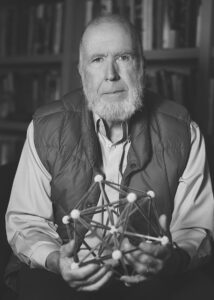Kevin Kelly is an author, photographer, and visionary with a keen interest in technology and futurism. In addition to his own books, Kelly is a founding editor and ongoing contributor for Wired Magazine. On his website, Kelly says, “I write in order to think.”

On this episode of EconTalk, Russ Roberts welcomes Kevin Kelly for a compelling conversation on advice and technology. Kelly introduces his new book Excellent Advice for Living. The two discuss useful mantras in their lives and why mantras work, along with the future of technology and our relationship to it. Roberts and Kelly speak to people’s reluctance to accept advice or have their mind changed. Why is it hard to listen to advice? What is the best way to reach young people with good advice?
1- Kelly and Roberts agree that discomfort is a good thing and that it is an agent for becoming a better person. How do you feel about discomfort? Are you able to consistently get outside of your comfort zone even when it means there will be an adjustment period? To what extent is the experience outside of a normal routine important for realizing new talents and interests?
2- Roberts and Kelly argue that maxims and mantras can help to build consistent, good habits which can protect a person from making mistakes. Kelly offers a powerful maxim with which a person should remember to consult a third thing when considering two sides.
How can thinking about a gray area, or a third side, help to illuminate an answer to a problem? Are people willing to consider a third side? In terms of a unique business plan in a competitive field, can you think of an individual or a company who utilized a third side of a black and white case to get ahead of competitors?
3- Kelly finds power in having control over his time as opposed to money. What is the advantage of caring more for time than money? How can planning in terms of life experiences and goals be more fulfilling than only planning for a career based on its monetary value? What might you give up when you choose to live this way? As Kelly himself says, you can never do things if you don’t give some things up…
4- Kelly and Roberts are skeptical of the technology panic cycle in which people are concerned about technology taking over humans. Today, we see different people have contrasting relationships with technology, where some let it harmfully dominate their daily lives while others utilize it in a productive manner.
What type of person is vulnerable to the power of technology? Will we always have the power that Roberts and Kelly allude to in shutting down technology if it becomes dangerously invasive?
5- Roberts disagrees with the utopian argument that AI will come to develop a mind of its own. Instead, he and Kelly recognize the value of having something that ‘thinks’ differently than us as humans, and that we should be more thoughtful consumers in utilizing AI.
What do you think about the trajectory of AI technology? Is there going to be exponential growth in AI which results in a problematic entity? To what extent do you agree with Kelly that there should be people working on how to “unplug” AI, just as there are people working to prevent asteroid strikes? (And is this a good metaphor???)
Brennan Beausir is a student at Wabash College studying Philosophy, Politics, and Economics and is a 2023 Summer Scholar at Liberty Fund.


Comments are closed.